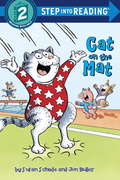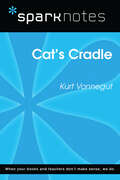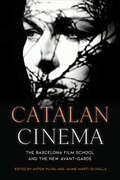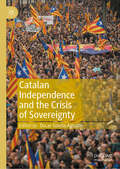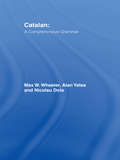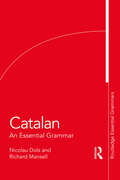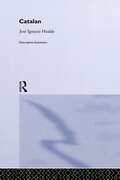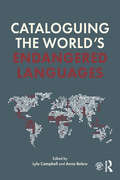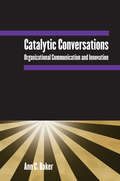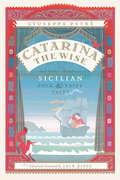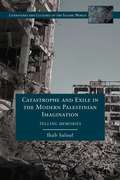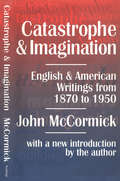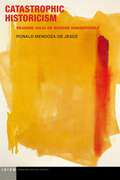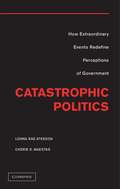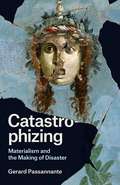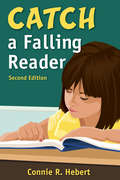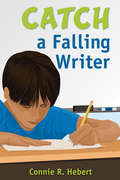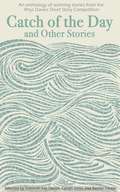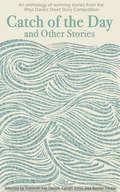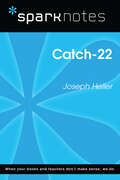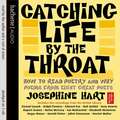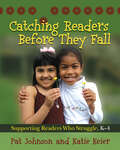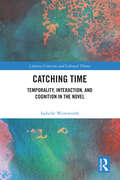- Table View
- List View
Cat on the Mat
by Jon Buller Susan SchadeGolden Books' dynamic series is the Only complete literacy program on the market. This program offers books at five levels, or Miles, that accompany children from their first attempts at reading and writing to successfully reading and writing on their own. -- Mirrors current teaching methods-- Fiction and nonfiction-- High-interest stories and kid-picked topics
Cat's Cradle (SparkNotes Literature Guide Series)
by SparkNotesCat's Cradle (SparkNotes Literature Guide) by Kurt Vonnegut Making the reading experience fun! Created by Harvard students for students everywhere, SparkNotes is a new breed of study guide: smarter, better, faster.Geared to what today's students need to know, SparkNotes provides:chapter-by-chapter analysis explanations of key themes, motifs, and symbols a review quiz and essay topicsLively and accessible, these guides are perfect for late-night studying and writing papers.
Catalan Cinema: The Barcelona Film School and the New Avant-Garde (Toronto Iberic)
by Anton Pujol Jaume Martí-OlivellaCatalan Cinema offers a theoretical reading of the most relevant cinematic productions to emerge from Catalonia in the last twenty years. The essays in this collection examine cinema in relation to the Escola de Barcelona (The Barcelona School), a group of cinema directors that drew inspiration from British pop-art, Free Cinema, and the Nouvelle Vague to create works that defied and challenged the Franco dictatorship. Highlighting the aesthetic, social, and political elements of Catalan cinematography, contributors to this volume explore what young directors have in common with works created by more notable directors such as Joaquim Jordà, Jacinto Esteva, Jordi Grau, and Pere Portabella. Catalan Cinema focuses on the importance of modern production and its connection with the avant-garde and underground cinema from the Barcelona School. Establishing a cinematic genealogy, the volume ultimately questions if Catalan cinema’s own push for self-expression may be interpreted as a connection to Catalonia’s current drive for independence.
Catalan Independence and the Crisis of Sovereignty
by Óscar García AgustínThis book explores the conflict between the Catalan project to become independent and the Spanish state’s opposition to any attempt of secessionism. The volume addresses some of the key political and academic issues of contemporary European societies: nationalism, separatism and sovereignty. The banned referendum in Catalonia in October 2017 unveiled the existence of multiple crises, from territorial to economic and political. Indeed, the Catalan issue is about the crisis of sovereignty: who holds legitimacy to make decisions, and who is in power legally and politically? The book is structured according to three themes: sovereignty and its people, where the realignment to independence, populism and the definition of the demos are discussed; collective identities and actions, to account for the shaping of ‘us’, the importance of collective memory and the cross-alliances forged during the referendum; and internationalization, focusing on Europeanisation, international media and comparative constitutional perspectives.
Catalan: A Comprehensive Grammar (Routledge Comprehensive Grammars)
by Max Wheeler Alan Yates Nicolau DolsCatalan: A Comprehensive Grammar is a complete reference guide to modern Catalan grammar, presenting an accessible and systematic description of the modern language. It is the only comprehensive grammar of the language available in EnglishThe Grammar reflects the current reality of Catalan by acknowledging regional diversity and features Balearic and Valencian varieties alongside the language used in the Barcelona region.The combined specialist knowledge of the author team ensures a balanced coverage of modern Catalan.Features include:* comprehensive coverage of all parts of speech* a wealth of authentic examples illustrating language points* attention to areas of particular difficulty for those whose first language is English* full cross-referencing* detailed index.
Catalan: An Essential Grammar (Routledge Comprehensive Grammars Ser.)
by Nicolau Dols Richard MansellCatalan: An Essential Grammar is a concise and convenient guide to the basic grammatical structure of Catalan. Presenting a fresh and accessible description of the language, this engaging Grammar uses clear explanations and sets out the complexities of Catalan in short, readable sections clarified by examples. Quick reference overviews are also provided in the appendix. Catalan: An Essential Grammar is the ideal reference grammar for all learners of Catalan, whether class-based or independent, looking to progress beyond beginner level.
Catalan: Catalan (Descriptive Grammars)
by Jose Ignacio HualdeFirst Published in 2004. Among the languages of Europe spoken by bilingual communities, Catalan has a special status because of its vitality. Catalan enjoys official recognition in Catalonia, Valencia and the Balearic Islands, in spain and in the principality of Andorra. Catalan is of importance within the Romance family because it constitutes a link between the Ibero-Romance family of languages and the Gallo-Romance branches. This book will be of interest to both Romanists and general linguists engaged in comparative work.
Cataloguing the World's Endangered Languages
by Lyle Campbell Anna BelewCataloguing the World’s Endangered Languages brings together the results of the extensive and influential Catalogue of Endangered Languages (ELCat) project. Based on the findings from the most extensive endangered languages research project, this is the most comprehensive source of accurate information on endangered languages. The book presents the academic and scientific findings that underpin the online Catalogue, located at www.endangeredlanguages.com, making it an essential companion to the website for academics and researchers working in this area. While the online Catalogue displays much data from the ELCat project, this volume develops and emphasizes aspects of the research behind the data and includes topics of great interest in the field, not previously covered in a single volume. Cataloguing the World’s Endangered Languages is an important volume of particular interest to academics and researchers working with endangered languages.
Catalytic Conversations: Organizational Communication and Innovation
by Ann C. BakerIn today's increasingly globalized world, it is essential that people of diverse ethnicities and socio-economic backgrounds learn to work together and communicate effectively. This book offers a breakthrough approach to recognizing that differences among people are resources for organizations to tap as they strive to anticipate change and adapt rapidly in an unpredictable world. "Catalytic Conversations" provides a conceptual framework for understanding how complex communication patterns of social networks influence, and are influenced by, organizational structures. It discusses how to enhance the quality and viability of groups and organizational life by paying attention to how people talk - and do not talk - to each other. The book distinguishes between conversations that support organizational enhancement and others that inhibit innovation, and explores the complexity of organizational communication in detail.
Catarina the Wise and Other Wondrous Sicilian Folk and Fairy Tales
by Jack Zipes Adeetje Bouma Giuseppe PitrèWell, gentlemen, here’s a tale that people have told time and again . . . . So begins the title story in this collection of fifty Sicilian folk and fairy tales edited and translated by noted folklore scholar Jack Zipes. But while some of the stories may sound as if they’ve been told time and again—such as variations on Cinderella and Puss in Boots—many will enchant English-language readers and storytellers for the first time. From “The Pot of Basil” to “The Talking Belly,” “The Little Mouse with the Stinky Tail” to “Peppi, Who Wandered out into the World,” the stories in Catarina the Wise range from simple tales of getting a new dress or something good to eat to fantastical plots for outwitting domineering husbands, rescuing impoverished fathers, or attracting wealthy suitors (frequently the Prince of Portugal). Many feature strong, clever women (usually daughters who become queen). Many are funny; many are wise. Some are very, very strange. As Zipes relates, the true story of their origins is as extraordinary as the tales themselves. Born to a poor family of sailors in Palermo, Giuseppe Pitrè would go on to serve with Garibaldi, become a traveling country doctor, and gather one of the most colossal collections of folk and fairy tales of the nineteenth century. But while his work as a folklorist rivaled that of the Brothers Grimm, Pitrè remains a relative unknown. Catarina the Wise highlights some of the most delectable stories at the heart of his collection. Featuring new, original illustrations, this book is a beautiful, charming treasure for any fan of story, storytelling, and heroines and heroes living happily ever after—sometimes.
Catastrophe and Exile in the Modern Palestinian Imagination
by Ihab SaloulThis book addresses central concepts to debates over Palestinian identity such as nostalgia and trauma, notions of home and forced travel, identity as representationally performative, and post-memory and geopolitical continuity of loss of place in the everyday.
Catastrophe and Imagination: English and American Writings from 1870 to 1950
by John McCormickSince World War II critics have been predicting the decline of the novel. This book argues that the novel is not dead. Looking at American and English fiction it claims that the novel can not only change the possibilities of art, but also contribute to awareness of life's possibilities.
Catastrophic Historicism: Reading Julia de Burgos Dangerously (Idiom: Inventing Writing Theory)
by Ronald Mendoza-de JesúsCatastrophic Historicism unsettles the historicist constitution of Julia de Burgos (1914–53), Puerto Rico’s most iconic writer—a critical task that necessitates redefining the concept of historicism. Through readings of Aristotle, Walter Benjamin, Jacques Derrida, Werner Hamacher, and Frank Ankersmit, Mendoza-de Jesús shows that historicism grounds historical objectivity in the historian’s capacity to compose totalizing narratives that domesticate the contingency of the past. While critiques of historicism as a realism leave untouched the sovereignty of the historian, the book insists that reading the text of history requires an attunement to danger—a modality that interrupts historicism by infusing the past with a contingency that evades total appropriation.After desedimenting the monumental tradition that has reduced de Burgos to a totemic figure, Catastrophic Historicism reads the poet’s first collection, Poema en 20 surcos (1938). Mendoza-de Jesús argues that the historicity of Poema crystallizes in the lyrical speaker’s self-institution as an embodied ipseity, which requires producing racialized/gendered allegorical figures—the bearers of an abject flesh—that lack any ontological resistance to modern alienation. Rather than treating de Burgos’s poetics of selfhood as the ideal image of Puerto Rican sovereignty, Mendoza-de Jesús endangers this idealization by drawing attention to the abjection that sustains our attachments to ipseity as the form of a truly sovereign life. In this way, Catastrophic Historicism not only resets the terms of ongoing critiques of historicism in the humanities—it also intervenes in Puerto Rican historicity for the sake of its transformation.
Catastrophic Politics
by Lonna Rae Atkeson Cherie D. Maestas"Shocking moments in society create an extraordinary political environment that permits political and opinion changes that are unlikely during times of normal politics. Strong emotions felt by the public during catastrophes, even if experienced only vicariously through media coverage are a powerful motivator of public opinion and activism. This is particularly true when emotional reactions coincide with attributing blame to governmental agencies or officials. By examining public opinion during one extraordinary event, the aftermath of Hurricane Katrina, Lonna Rae Atkeson and Cherie D. Maestas show how media information interacts with emotion in shaping a wide range of political opinions about government and political leaders. Catastrophic events bring citizens together, provide common experiences and information, and create opinions that transcend traditional political boundaries. These moments encourage citizens to reexamine their understanding of government, its leaders, and its role in a society from a less partisan perspective"--
Catastrophizing: Materialism and the Making of Disaster
by Gerard Passannante“Few books could be more relevant . . . Passannante examines the human inclination to imagine sudden, all-consuming destruction.” —Rebecca Totaro, The Spenser ReviewWhen we catastrophize, we think the worst. We make too much of too little, or something of nothing. Yet what looks simply like a bad habit, Gerard Passannante argues, was also a spur to some of the daring conceptual innovations and feats of imagination that defined the intellectual and cultural history of the early modern period.Reaching back to the time between the Renaissance and the Enlightenment, Passannante traces a history of catastrophizing through literary and philosophical encounters with materialism—the view that the world is composed of nothing but matter. As artists, poets, philosophers, and scholars pondered the physical causes and material stuff of the cosmos, they conjured up disasters out of thin air and responded as though to events that were befalling them. From Leonardo da Vinci’s imaginative experiments with nature’s destructive forces to the fevered fantasies of doomsday astrologers, from the self-fulfilling prophecies of Shakespeare’s tragic characters to the mental earthquakes that guided Kant toward his theory of the sublime, Passannante shows how and why the early moderns reached for disaster when they ventured beyond the limits of the sensible. He goes on to explore both the danger and the critical potential of thinking catastrophically in our own time.“Brings together literature, visual art, and the history of science to provide rich insights into catastrophic thinking and the history of materialist thought.” ―The British Society for Literature and Science (award citation)
Catch That Chicken!: Targeting the ch Sound (Speech Bubbles 2)
by Melissa PalmerArchie has stolen Charlie’s prize hat – the race is on to get it back. Catch that chicken! This picture book targets the /ch/ sound and is part of Speech Bubbles 2, a series of picture books that target specific speech sounds within the story. The series can be used for children receiving speech therapy, for children who have a speech sound delay/disorder, or simply as an activity for children’s speech sound development and/or phonological awareness. They are ideal for use by parents, teachers or caregivers. Bright pictures and a fun story create an engaging activity perfect for sound awareness. Picture books are sold individually, or in a pack. There are currently two packs available – Speech Bubbles 1 and Speech Bubbles 2. Please see further titles in the series for stories targeting other speech sounds.
Catch a Falling Reader
by Constance R. HebertThe author offers research-based strategies that empower teachers to stimulate students' interest in reading, identify common mistakes of struggling readers, and promote healthy reading habits.
Catch a Falling Writer
by Constance R. HebertCatch falling writers in Grades K–3 before feelings of frustration and low confidence develop! This book offers research-based strategies that foster independent writing.
Catch of the Day: Rhys Davies Short Story Collection 2014
by Literature WalesAn anthology of nine winning short stories from this highly regarded competition which has run since 1991 and celebrates contemporary Welsh writing in English. It also includes the winner and runner-up from the inaugural Under-21 Prize. The stories range widely in time and place - from Wales to Sweden and from the First World War to the present day - but all of them are rich in a sense of 'human-ness' and contain as Rhys Davies described a 'tiny, concentrated explosion' that makes you re-evaluate your life and yourself. Together they help to answer the question 'what makes a good story?' The title of the anthology, Catch of the Day, is taken from the winning entry, which deals with the question of loss and bereavement with a subtle and unexpected twist.
Catch of the Day: Rhys Davies Short Story Collection 2014
by Literature WalesAn anthology of nine winning short stories from this highly regarded competition which has run since 1991 and celebrates contemporary Welsh writing in English. It also includes the winner and runner-up from the inaugural Under-21 Prize.The stories range widely in time and place - from Wales to Sweden and from the First World War to the present day - but all of them are rich in a sense of 'human-ness' and contain as Rhys Davies described a 'tiny, concentrated explosion' that makes you re-evaluate your life and yourself. Together they help to answer the question 'what makes a good story?' The title of the anthology, Catch of the Day, is taken from the winning entry, which deals with the question of loss and bereavement with a subtle and unexpected twist.
Catch of the Day: Rhys Davies Short Story Collection 2014
by Literature WalesAn anthology of nine winning short stories from this highly regarded competition which has run since 1991 and celebrates contemporary Welsh writing in English. It also includes the winner and runner-up from the inaugural Under-21 Prize.The stories range widely in time and place - from Wales to Sweden and from the First World War to the present day - but all of them are rich in a sense of 'human-ness' and contain as Rhys Davies described a 'tiny, concentrated explosion' that makes you re-evaluate your life and yourself. Together they help to answer the question 'what makes a good story?' The title of the anthology, Catch of the Day, is taken from the winning entry, which deals with the question of loss and bereavement with a subtle and unexpected twist.
Catch-22 (SparkNotes Literature Guide Series)
by SparkNotesCatch-22 (SparkNotes Literature Guide) by Joseph Heller Making the reading experience fun! Created by Harvard students for students everywhere, SparkNotes is a new breed of study guide: smarter, better, faster.Geared to what today's students need to know, SparkNotes provides:chapter-by-chapter analysis explanations of key themes, motifs, and symbols a review quiz and essay topicsLively and accessible, these guides are perfect for late-night studying and writing papers.
Catching Life By The Throat: How to Read Poetry and Why
by Josephine HartThis audiobook is an anthology of poems by WH Auden, TS Eliot, Philip Larkin, Emily Dickinson, Marianne Moore, Rudyard Kipling, Sylvia Plath and W B Yeats, introduced by Josephine Hart and read by a cast of famous actors: Ralph Fiennes, Edward Fox, Ian McDiarmid, Helen McCrory, Sir Roger Moore, Harold Pinter, Elizabeth McGovern, Harriet Walter, Sir Bob Geldof, Sinead Cusack, Grey Gowrie, Rupert Graves and Juliet Stevenson. 'The idea is simple,' says Josephine Hart as she introduces the poets and takes us through their life and writings, 'an understanding of the life and philosophy of the poet illuminates the poetry and therefore makes the experience of reading or listening to each poem more intense.' Whether you believe, like Robert Frost, that poetry is a way of catching life by the throat or, like Eliot, it is one person talking to another, nobody does it better than the poets whose work and life will feature in this publication.
Catching Readers Before They Fall: Supporting Readers Who Struggle, K-4
by Pat Johnson Katie KeierEvery teacher of reading plays a vital role in helping to catch those readers for whom learning to read does not come easily. Through examples from both adults and children, the authors explain and describe the complex integrated network of strategies that go on in the minds of proficient readersstrategies that struggling readers have to learn in order to construct their own reading processes. This book is essential reading for all who work with struggling readers in any context and contains a wealth of resources, including a thorough explanation of all the sources of information readers use to solve words, examples and scenarios of teacher/student interactions, prompts to use with struggling readers, lessons on modeling, and assessment guidelines.
Catching Time: Temporality, Interaction, and Cognition (Literary Criticism and Cultural Theory)
by Isabelle Wentworth'Time travels in divers paces with divers people.' Shakespeare’s oft-quoted line contains a hidden ambiguity: not only do individual people experience time differently, but time travels in diverse paces when we are with diverse persons. The line articulates a contemporary understanding of subjective time: it is changed by interaction with our social environment. Interacting with other people—and even literary characters—can slow or quicken the experience of time. Interactive time, and the paradigm of enactive cognition in which it sits, calls for an expansion of traditional ideas of time in narrative. The first book-length study of interactive time in narrative, Catching Time explains how lived time and narrative time interpenetrate each other, so that the relational model of subjective time acts as a narrative function. Catching Time develops a novel, interdisciplinary framework, drawing on cognitive science, narratology, and linguistics, to understand the patterns of temporality that shape narrative.
